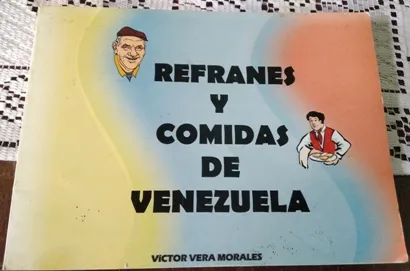En todas las culturas del mundo existen lo que se conoce como refranes. Un refrán, de acuerdo a la Real Academia Española de la Lengua (2019) consiste en: “dicho agudo y sentencioso de uso común”; en otras palabras, una pequeña frase u oración ingeniosa que explica o se aplica a una situación en concreto. En Venezuela, el uso de refranes es algo común y muy útil, ya que en poquísimas palabras condensan un sabio consejo o una buena explicación. Es por tal razón, que hoy comienzo una serie de publicaciones en donde expondré y explicaré algunos de los refranes de mi país. Aclaro que he tomado como fuente de consulta el libro escrito por mi abuelo Víctor Vera Morales, El Poeta, (quien realmente fue mi tío, pero yo siempre lo consideré mi abuelo), y quien fue autor de muchas obras poéticas y literarias, siendo una de éstas “Refranes y Comidas de Venezuela” (2004). Si bien extraigo de allí los refranes, la explicación es de mi autoría.
In all the cultures of the world there are what are known as sayings. A saying, according to the Royal Spanish Academy of the Language (2019) consists of: "acute and sententious adage in common use"; in other words, a clever little phrase or sentence that explains or applies to a particular situation. In Venezuela, the use of sayings is something common and very useful, since in very few words they condense a wise advice or a good explanation. It is for this reason that today I begin a series of publications where I will expose and explain some of the sayings of my country. I clarify that I have taken as a source of reference the book written by my grandfather Víctor Vera Morales, El Poeta, (who was really my uncle, but I always considered him my grandfather), and who was the author of many poetic and literary works, being a of these "Sayings and Foods of Venezuela" (2004). Although I extract the sayings from there, the explanation is my own.

1) “El que tiene techo de vidrio no le tira piedras al vecino.” Esto quiere decir que no hay que criticar ni murmurar sobre los demás, ya que nosotros también tenemos defectos, quizás hasta peores.
"The one with the glass roof doesn't throw stones at the neighbor." This means that we should not criticize or murmur about others, as we also have flaws, perhaps even worse.
2) “Una mano lava la otra y las dos lavan la cara.” Refrán muy aplicable a todo grupo humano, como es el caso de la comunidad Hive, en el que sólo la solidaridad y cooperación permiten el bienestar común.
"One hand washes the other and they both wash their faces." A very applicable saying to any human group, such as the Hive community, in which only solidarity and cooperation allow the common welfare.
3) “El pez muere por la boca.” Tiene dos explicaciones: La primera se refiere a la ingesta de comidas que pueden enfermar a la persona (tal como el pez que muerde el anzuelo para comer la carnada y termina muerto); y la segunda, cuando una persona habla en exceso y se perjudica a sí misma.
"The fish dies by mouth." It has two explanations: The first refers to the ingestion of foods that can make the person sick (such as the fish that bites the hook to eat the bait and ends up dead); and the second, when a person talks excessively and harms himself.
4) “Al amigo y al caballo no cansarlo.” Este refrán quiere decir que no debemos ser desconsiderados, abusivos e irrespetuosos ni con el amigo ni con el caballo, porque nos podemos quedar sin ambos.
"Don't tire your friend and your horse." This saying means that we should not be inconsiderate, abusive and disrespectful neither with the friend nor with the horse, because we can be left without both.
5) “El que escupe para arriba, la saliva le cae en la cara.” Este es otro refrán que aconseja no hablar o murmurar demás, pues más adelante puede traernos consecuencias.
"He who spits up, the saliva falls on his face." This is another saying that advises not to speak or murmur more, because later it can bring us consequences.
Fuentes Bibliográficas / Bibliographical sources:
Real Academia Española de la Lengua (2019). [Documento en línea, Disponible: https://dle.rae.es/refr%C3%A1n]
Víctor Vera Morales. (Agosto 2004). Refranes y Comidas de Venezuela. Editado por el Instituto Municipal de Publicaciones de la Alcaldía de Caracas.
Fuentes de las imágenes / Image sources:
Fotos de mi autoría, tomada con un teléfono REDMI 8 A / Photos of my authorship, taken with a REDMI 8 A telephone
Los diseños incluidos en esta publicación, han sido elaborados por mi persona con la aplicación CANVA / The designs included in this publication has been made by me with the CANVA application.
En caso de que se requiera emplear el contenido o imágenes de este post y de mis otras publicaciones, agradecería se hiciera referencia a mi autoría (Fabiola Martínez Morales) y se citara el link correspondiente. Gracias. / In the event that it is required to use the content or images of this post and my other publications, I would be grateful if my authorship (Fabiola Martínez Morales) was made and the corresponding link was cited. Thank you.





